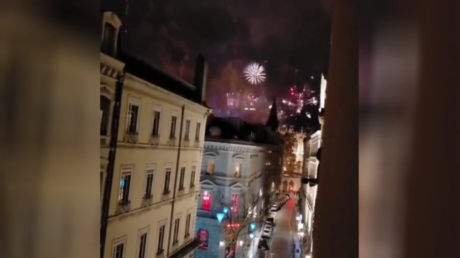
The city of Lyon in France was the scene of a spectacular display of solidarity as residents held both a somber and reflective candlelight celebration of the Festival of Lights before unleashing an awe-inspiring fireworks display.
Due to coronavirus pandemic restrictions, the city held a much more subdued version of its annual festival, foregoing the intricate public projections typically shone on the facades of historic buildings in the city center and opting instead for tens of thousands of candles on window sills.
A “fresco of luminous solidarity” was created in the ancient amphitheater of Lyon, comprising some 20,000 candles, designed as a “huge thank you to caregivers and to all those involved in the current health crisis.”
By 9pm, however, the city unleashed an arsenal of artistic artillery into the night sky, with a thunderous roar and at times blinding light produced by a phenomenal array of fireworks.
The Fete des Lumieres (Festival of Lights) is held each year in honor of the Virgin Mary, and typically attracts hundreds of thousands of visitors under normal circumstances.
The celebration ran from Saturday, December 5 and concluded on Tuesday, December 8 with the spectacular finale.
Under ordinary circumstances, the festival sees the streets, squares and the facades of buildings illuminated with spectacular projections and moving art installations made of light. However, this year Covid-19 restrictions rendered such wonders impossible.
The Fete des Lumieres originated in 1643, as the city was battling another pandemic, the bubonic plague, and citizens called on the Virgin Mary to protect them.
In 1852, city authorities unveiled a statue in honor of Mary, but a storm beset the city just prior to the inauguration. However, the skies suddenly cleared, a phenomenon which was marked by lighting up tens of thousands of candles in a tradition which continues to this day, with some modern upgrades during non-pandemic years.
Like this story? Share it with a friend!




